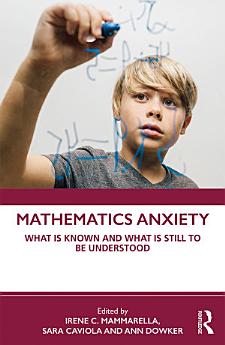Mathematics Anxiety: What is Known and What is still to be Understood
About this ebook
Featuring contributions from leading international researchers, Mathematics Anxiety challenges preconceptions and clarifies several crucial areas of research, such as the distinction between mathematics anxiety from other forms of anxiety (i.e., general or test anxiety); the ways in which mathematics anxiety has been assessed (e.g. throughout self-report questionnaires or psychophysiological measures); the need to clarify the direction of the relationship between math anxiety and mathematics achievement (which causes which).
Offering a revaluation of the negative connotations usually associated with mathematics anxiety and prompting avenues for future research, this book will be invaluable to academics and students in the field psychological and educational sciences, as well as teachers working with students who are struggling with mathematics anxiety
Ratings and reviews
- Flag inappropriate
About the author
Irene C. Mammarella is Associate Professor at the University of Padova, Italy. Her research interests include the role of working memory and emotional aspects in specific learning disorders, and other neurodevelopmental disorders. She is the co-founder of a university clinical center for neurodevelopmental disorders (Lab.D.A. srl).
Sara Caviola is a Lecturer in Developmental Psychology, at the School of Psychology, University of Leeds, UK. She won a Marie Skłodowska-Curie fellowship and spent two years at the Centre for Neuroscience in Education, University of Cambridge. Her main interests span from the analyses of cognitive and emotional underpinnings of mathematical cognition, in both children and adult populations.
Ann Dowker is University Research Lecturer at the Department of Experimental Psychology, Oxford University, UK. She has edited and co-edited several books, and is the author of ‘Individual Differences in Arithmetic: Implications for Psychology, Neuroscience and Education’ (Routledge, 2019). She is the lead researcher on the Catch Up Numeracy intervention project.







